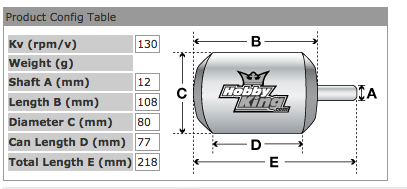When I first started building my Boxer-EV, the motor I installed in it was the largest brushless motor available for RC systems:
Model: HXT80-100-B
Wire Turns: 8
Resistance: 32ohm
Idle Current: 2A
ESC Required: 130A
Input Voltage : max. 48V
Kv : 130 rpm/V
Weight: 1570g
Shaft: 12mm
Voltage Range: 20-48v
Non Load Current: 2.0A
Maximum Power: 6500W
Equivalent: 60-80cc Gas Engine
I've been very happy with it. With my 48 volt setup, I'm producing enough power that my drive belt started slipping -- so I reduced the gearing a bit to back off the torque. Still, vroom vroom.
ProgressiveRC.com has a great online list of RC brushless motors and you can sort by watts consumed. Looks like there are some great 10,000 watt motors (holy cowabunga!) the only problem being they are around US$2000 and above. My $130 + shipping RC motor is still on the top of the price/performance curve.
It looks like the dealer in Hong Kong I get things from has come out with a new version of the motor. The specs seem the same but they note: "Tight, thick copper windings and 48SH magnets make this motor a real powerhouse. The v2 motor also has screwed end-caps due to the amount of torque this motor produces!"
Model: TR80-100-B
Wire Turns: 8
Resistance: 32ohm
Idle Current: 2A
ESC Required: 130A
Input Voltage : max. 48V
Kv : 130 rpm/V
Weight: 1570g
Shaft: 12mm
Voltage Range: 20-48v
Non Load Current: 2.0A
Maximum Power: 6500W
Equivalent: 60-80cc Gas Engine



 I recently installed an Engine Block Heater (EBH) into my 2008 Prius -- just in time before this artic frigid weather struck New England. The part is a stock Prius Canada part that fits directly into American Prii without modification -- you don't even have to drain the antifreeze or remove an engine block plug like you do in other cars.
I recently installed an Engine Block Heater (EBH) into my 2008 Prius -- just in time before this artic frigid weather struck New England. The part is a stock Prius Canada part that fits directly into American Prii without modification -- you don't even have to drain the antifreeze or remove an engine block plug like you do in other cars.
Recent Comments